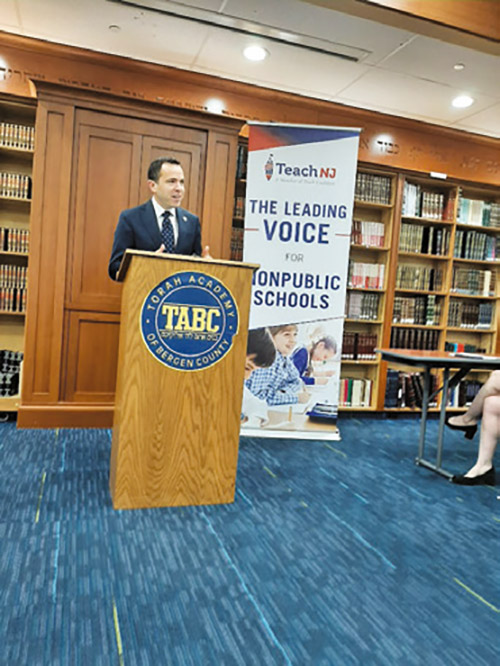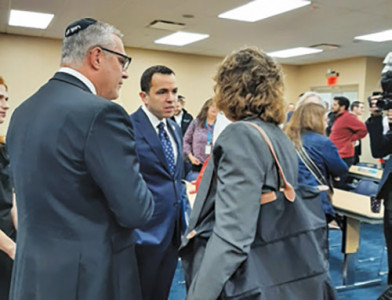
Amid the record-setting increase in antisemitic incidents in New Jersey and across the nation, there is some good news—confidence in reporting such hate to state authorities has also risen, allowing authorities to more aggressively track and act on them. That bit of light in the darkening picture of bias against Jews was delivered by State Attorney General Matthew Platkin during an April 21 program with community leaders at the Torah Academy of Bergen County in Teaneck. The program was sponsored by Teach NJ in partnership with the Jewish Federation of Northern New Jersey and the Jewish Federation of Southern New Jersey.
During the session, which drew local rabbis, day school leaders and governing officials, Platkin noted bias incidents began inching upward in 1994 and those targeting the Jewish community have mirrored that trend with 446 antisemitic incidents recorded last year.
“If you see something unsettling, report it,” said Platkin, adding incidents are evaluated by his office to pinpoint trends, possible linkage and how best to delegate law enforcement. “It breaks my heart honestly to hear someone say, ‘We thought it was too small. It was only a swastika on a playground.’”

“I tell you nothing is too small,” added Platkin, because often those who commit more serious acts of terrorism or violence start with smaller incidents. “It’s not normal, it’s not acceptable and we won’t tolerate it here,” he said.
Platkin said there are a variety of ways to report, which can be done anonymously, including contacting local police or calling the state bias hotline—through which incidents are evaluated within 24 hours.
“Building trust with communities is essential,” he noted, as is assertive action. He cited his office’s pursuit of a terrorism charge, among others, for a Manchester man for a series of attacks on Orthodox and chasidic Jews in Lakewood and Jackson. The man has since also been indicted for federal hate crimes.
The state, which has the nation’s oldest civil rights legislation, works closely with law enforcement, from county prosecutors to state police to local authorities, and is cognizant of holy days, such as the High Holidays for Jews or Ramadan for Muslims, to keep a close eye out for bias crimes and incidents.
The attorney general’s office trains local law enforcement in how the state’s system of reporting works and has received federal grants for such training, which can be requested by a community.
Among the reasons for the steep increase in hate crimes and bias incidents is the willingness by people in authority, both politicians and entertainers, to say and do things that encourage bias and antisemitism.
“When certain celebrities go out with known Nazis, that has an impact,” said Platkin. “This is something not to be trifled with. What people say on social media doesn’t go in a black hole. It manifests itself in actions taken in real life.”
He called out social media companies for being “a big part of the problem” and noted while they all have terms of conduct prohibiting hate speech and promotion of violence, they don’t adhere to them.
“We are very focused on holding them accountable to their terms of service,” said Platkin, who is spearheading a coordinated multi-state effort to force them into living up to their responsibilities.
The rise of white nationalism and neo-Nazis and their proliferation of antisemitism has encouraged hatred and violence in New Jersey and across the nation. However, on the plus side Platkin said the state police have “robust” capabilities of tracking online hatred.
The sharp reduction in gun violence in New Jersey, which is now the leading cause of death of American children, is a key component in countering hate-induced crime, he stated. Last year his office announced the country’s first office dedicated to civil actions against firearms companies to hold them accountable for law violations that harm the health and safety of state residents.
In addition, the New Jersey Office of Homeland Security and Preparedness has awarded 131 Non-Profit Security Grants, many of them to Jewish institutions. It was through one such grant that Temple Ner Tamid in Bloomfield installed shatterproof glass that prevented damage when a Molotov cocktail was thrown earlier this year at its front door. Within days authorities arrested the alleged attacker.
Last year Platkin convened the state’s first-ever summit on hate, bias and violence attended by law enforcement authorities and Gov. Phil Murphy.
“We will continue to do anything we can, and partnership with the community is critical,” said Platkin. “Anything you think we need to do we will do. Trust may be a buzzword, but it is critical.”
Platkin also asserted that education has a role to play and pointed out training of law enforcement is also being carried out with the United States Holocaust Memorial Museum.
“A lot of law enforcement turned a blind eye during the Holocaust and you can see the parallels today,” said Platkin.
Expanding on that call for education into the general community, Englewood Mayor Michael Wildes said the local problem was not with white supremacists, but rather with the silence of others. He said he has heard antisemitic remarks made at council meetings.
“We had a coach come to the microphone and ask why we should care about the Holocaust—it didn’t happen in this country,” he said.










